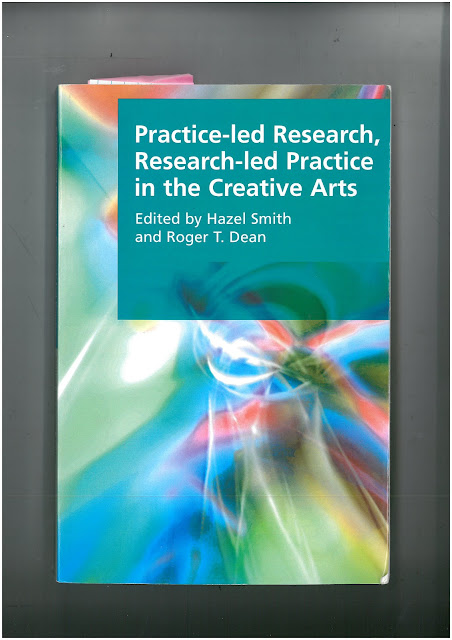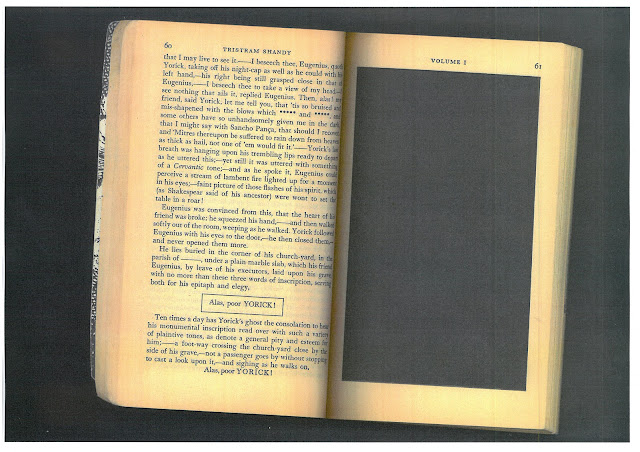I am organising new hardware. This involves archiving my
PhD production files and my emails. I have come across
scans. These are from late 2015 to May 2018. These are
scans I sent to myself from photocopiers at work.
They document my research, books, ideas, interests,
drawings, diagrams and research supervision notes. I have
a scan of Smith and Dean’s book about Practice-led
Research (2009). This is my first reading on integrating
artistic practice with academic research. From my early
investigations into music and working with G sharp minor
I have a scan of a 12-inch from Huddersfield Music
Library. This is Scriabin’s Second Symphony. Scriabin
composed in G sharp minor. From what I remember this
symphony is not in this key. Kenneth Goldsmith’s
Traffic in Perloff’s work exploring poetry (2010). There
are references in this work to Oulipo poetry and my
scan is from 2016. My original scan of Sterne’s black
page from Tristram Shandy (2000) is here from 2016.
I hadn’t considered before there is a front and back
to this black page. One of my favourite scans is
from a book of Samuel Beckett’s production of Happy
Days (1986). I have two scans of this, one from 2016
and another from 2018, start and finish of my
scanning. This is a notebook of transcriptions of Beckett’s
production notes for this play. Editor James
Knowlson has included all errors, mistakes, omissions,
and gaps in this transcription. I have drawings from
2016. These are from title slates opening Eisenstein’s 1925
film Strike. Alison recommended it to me for this
reason. Not all this work was in my final thesis.
Scan of Practice-led Research, 2016. Source: Smith and Dean, 2009.
Scan of Scriabin’s Second Symphony, 2015. Source: Scriabin, n.d.
Scan of Perloff’s work exploring Kenneth Goldsmith’s Traffic,
2016. Source: Perloff, 2010.

Scans of Sterne’s Black Page in Tristram Shandy, front and
back, 2016. Source: Sterne, 2000.
Scan of Beckett’s Happy Days Notebooks, 2016. Source:
Beckett, 1986.
Scans of drawings from Eisenstein’s 1925 film Strike, 2016. Source:
Author.
I have rediscovered Takflix, a brilliant Ukrainian
film streaming platform. I re-encountered this through a
talk at Visions du Réel with Ukrainian film makers,
exploring filming in resistance. Nadia Parfan was on this
panel and I was looking for her work. I have viewed
four films. Mariupolis by Mantas Kvedaravičius
a Lithuanian film maker who died from shooting
by Russian soldiers in April 2022. This film is from
2016. Kvedaravičius returned to Mariupolis this year
to make a second part to this film during Russia’s
current siege of Mariupol (e-flux, 2022). Another
feature film is Nadia Parfan’s 2019 film Heat Singers.
This was a brilliant view of a group of engineers who
have a work choir. I have watched two short films
Dream Machine in Ukrainian by Katerina Oliynik from
2018 and Bridge by Olena Moskalchuk and Oksana
Nosach from 2016. I have one more film lined up.
This is Enter Through the Balcony (Blazhan, 2020).
This is a brilliant way to watch Ukrainian films. It is
also a brilliant way for me to support Ukrainian culture,
individual film making and I have also sent these films
as gifts.
Part of my final Ukrainian lesson in term one was
translating Ukrainian recipes. Below is a recipes for
Borsch. There are specific verbs in this recipes
to describe very particular aspects of food preparation.
For example кубиками, cubes, is to dice and
соломкою to straw, or make thin, strips, this is
for cabbage. I love how specific this is. Yelyzaveta
pointed out all this writing is very much in
present tense, very immediate, very much in a
particular moment. This relates to Recipes for Baking
Bread and my original intentions to use recipes to recount
stories from history. I love this contract, where language
from an immediate sense of present, now, appears with
stories from past events. This relates to ideas in my
thesis from Tolstoy’s use of ‘now’ in language in his
novels. These verbs also appear many times in first
person, we, form. This relates to my ideas of cooking,
baking and recipes as collective and shared activities.
References:
Beckett, S. (1986) Happy Days: The Production Notebook of Samuel Beckett. Edited by J. Knowlson. New York: Grove Press.
Blazhan, R. (2020) Enter Through the Balcony [Online]. Available from: <https://takflix.com/en/films/enter-through-the-balcony> [Accessed 17 April 2022].
e-flux (2022) From Barzakh to Mariupolis: In Memory of Mantas Kvedaravičius [Online]. New York: e-flux. Available from: <https://www.e-flux.com/announcements/461330/from-barzakh-to-mariupolis-in-memory-of-mantas-kvedaraviius/> [Accessed 17 April 2022].
Kvedaravičius, M. (2016) Mariupolis [Online]. Available from: <https://takflix.com/en/films/mariupolis> [Accessed 17 April 2022].
Moskalchuk, O. and Nosach, O. (2016) Bridge [Online]. Available from: <https://takflix.com/en/films/bridge> [Accessed 17 April 2022].
Oliynik, K. (2018) Dream Machine [Online]. Available from: <https://takflix.com/en/films/dream-machine> [Accessed 17 April 2022].
Parfan, N. (2019) Heat Singers [Online]. Available from: <https://takflix.com/en/films/iftke> [Accessed 17 April 2022].
Perloff, M. (2010) Unoriginal Genius: Poetry by Other Means in the New Century. Chicago: The University of Chicago Press.
Reddebrek (2013) Strike! – Sergei Eisenstein [Online video]. Available from: <https://www.youtube.com/watch?v=uLiNKaUp0AA> [Accessed 17 April 2022].
Scriabin. (n.d.) Second Symphony, Georg Semkor and London Philharmonic Orchestra. CBS. [Sound recording: LP].
Smith, H. and Dean, R. eds. (2009) Practice-Led Research, Research-Led Practice in the Creative Arts. Edinburgh: Edinburgh University Press.
Sterne, L. [1759] (2000) The Life and Opinions of Tristram Shandy. Oxford: Oxford University Press.